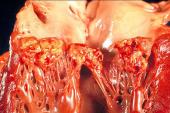Partial Oral Antibiotic Regimen for Endocarditis Effective in Real World
Following the POET trial, Danish researchers showed the protocol could improve outcomes and decrease length of hospital stays.

Among patients with left-sided IE who matched the inclusion criteria of the Partial Oral Treatment of Endocarditis (POET) study, oral therapy compared with intravenous antibiotics was associated with a lower incidence of the primary endpoint—embolism, nonplanned valve surgery, bacteremia with the primary pathogen, and all-cause mortality—that bordered on statistical significance.
All-cause mortality was significantly lower among IE patients switched to oral antibiotics, report investigators.
“In the randomized trial, you have a semicontrolled environment, but we’re using this regimen in Denmark, and we wanted to show how it’s been working for our patients,” Mia Marie Pries-Heje, MD (Copenhagen University Hospital, Rigshospitalet, Denmark), who presented the results at the American Heart Association (AHA) 2022 Scientific Sessions, told TCTMD. “We’re hoping to encourage other parts of the world to implement this as well.”
Patients with left-sided IE are frequently treated with IV-administered antibiotics for up to 6 weeks in the hospital. During the initial phase before stabilization, they require close monitoring, and in some cases, intensive care. Long hospital stays are associated with an increased risk of complications, as well as higher costs, so POET was designed with the aim of transitioning patients to oral antibiotics to reduce these risks.
Published 4 years ago and as reported by TCTMD at the time, investigators showed that partial oral antibiotic therapy started after the initial phase of treatment—they were shifted to oral antibiotics around day 17 after the bacteremia had been cleared and the patient stabilized—was noninferior to complete IV antibiotic therapy for the primary endpoint. As a result of POET, the treatment strategy was incorporated into the Danish guidelines for the management of infective endocarditis and is expected to be incorporated into future international guidelines, said Pries-Heje.
Driven by Differences in All-Cause Mortality
The new study, presented earlier this week during a featured science session at the AHA meeting, focused on clinical outcomes of POET-like patients who were treated with the partial oral antibiotic regimen in the real world. This included patients with left-sided IE resulting from one of four pathogens: streptococcus, Staphylococcus aureus, Enterococcus faecalis, and coagulase-negative staphylococci. The retrospective, observational study included 560 patients with IE who matched the POET inclusion criteria in Denmark between May 2019 and December 2020.
In total, 238 were treated with the oral stepdown antibiotic regimen and 322 treated with IV antibiotics for the full duration. In terms of clinical characteristics, patients were well matched between the groups, with no difference in age, gender, comorbidities, or infected heart valve. Individuals with a pacemaker, a Staphylococcus aureus infection, an intracardiac abscess, and those who’d undergone valve surgery for endocarditis were more likely to be treated with IV antibiotics.
We’re hoping to encourage other parts of the world to implement this as well. Mia Marie Pries-Heje
Patients treated with the stepdown protocol were discharged from hospital 15 days earlier than those treated with IV antibiotics.
Investigators assessed the same clinical outcomes measured in the POET trial. At 6 months, there was a borderline reduction in clinical outcomes with the partial oral antibiotic strategy (P = 0.056). In a fully adjusted model, however, partial oral antibiotic therapy was associated with a 41% lower risk of the primary endpoint (HR 0.59; 95% CI 0.37-0.92).
“It was mainly driven by a difference in all-cause mortality,” said Pries-Heje. “There were no differences in the other three elements of the primary outcomes, but there was a significantly lower all-cause mortality rate among patients in the oral antibiotic arm after 6 months.”
In 123 patients who underwent cardiac surgery for IE, the primary composite endpoint occurred in 10.6% of the 85 patients treated with IV antibiotics compared with a rate of 2.6% in those who received partial oral antibiotics. In the patients with an intracardiac abscess, the event rate was also lower in patients with treated with oral antibiotics.
The study, said Pries-Heje, shows that implementing the POET protocol for patients with left-side IE is both feasible and safe, shortening hospital lengths of stay and improving clinical outcomes.
Joanna Chikwe, MD (Cedars-Sinai Medical Center, Los Angeles, CA), called the new study a “phenomenal example of implementation science, going from a well-designed randomized, controlled trial to actually seeing how things work in practice using a clinical registry.” One question, she asked, related to the use of transesophageal echocardiography (TEE) as part of the POET protocol. Pries-Heje said TEE is part of the stabilization criteria and used to rule out abscess formation or disease progression that isn’t apparent from the patient’s presentation.
“We do see we catch something we weren’t expecting when we do transesophageal echocardiography,” said Pries-Heje. She noted they performed a subgroup analysis on patients who didn’t meet the stabilization criteria before being switched to oral stepdown antibiotics and these patients fared worse than those treated with IV antibiotics. “We consider [TEE] an important part of determining whether these patients are ready to transition into oral therapy,” said Pries-Heje.
Michael O’Riordan is the Managing Editor for TCTMD. He completed his undergraduate degrees at Queen’s University in Kingston, ON, and…
Read Full BioSources
Pries-Heje MM, on behalf of the POET investigators. Results from the clinical implementation of partial oral treatment of patients with infectious endocarditis: a nationwide outcomes study. Presented at: AHA 2022. November 6, 2022. Chicago, IL.
Disclosures
- Pries-Heje reports no conflicts of interest.





Comments